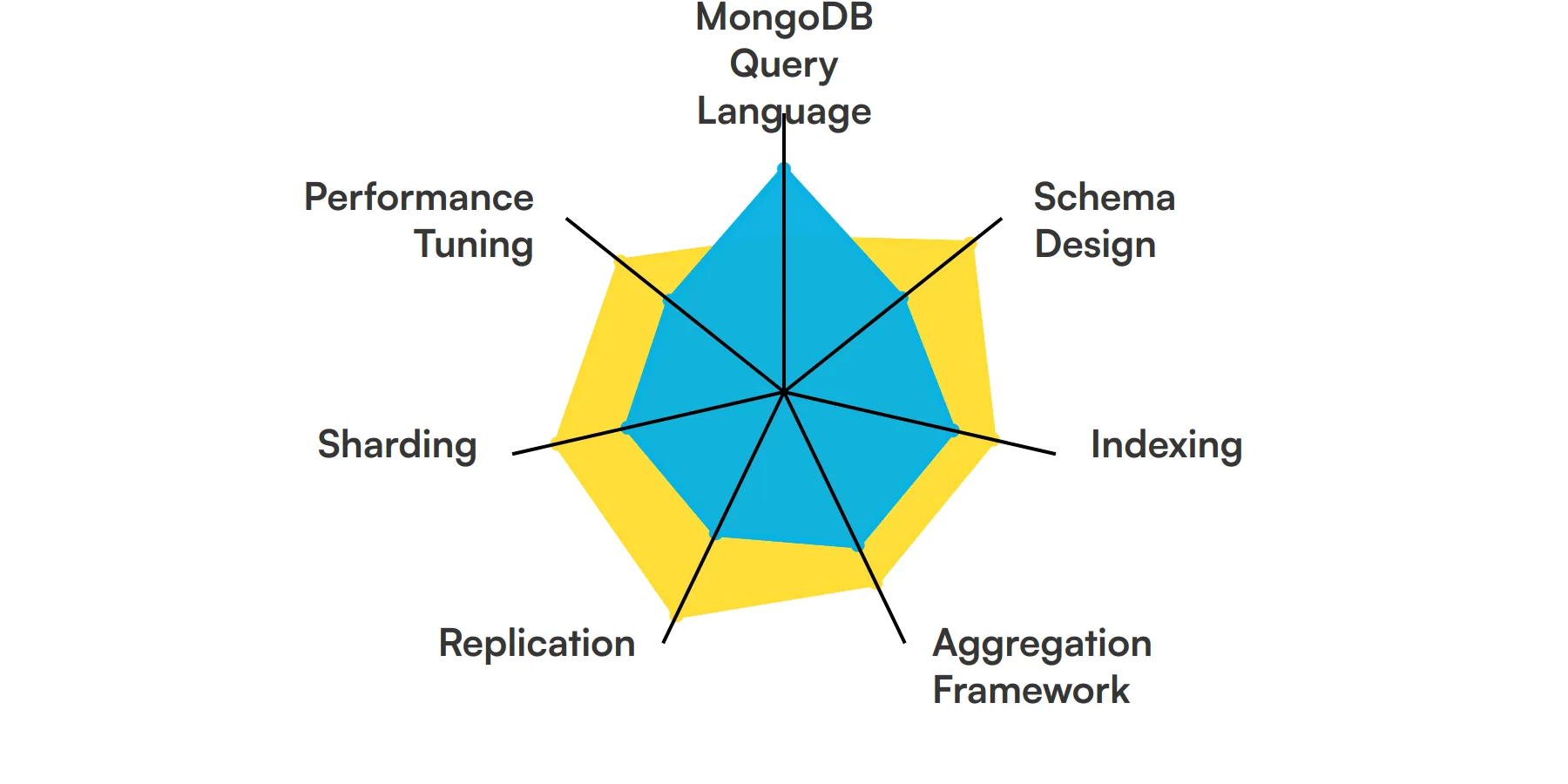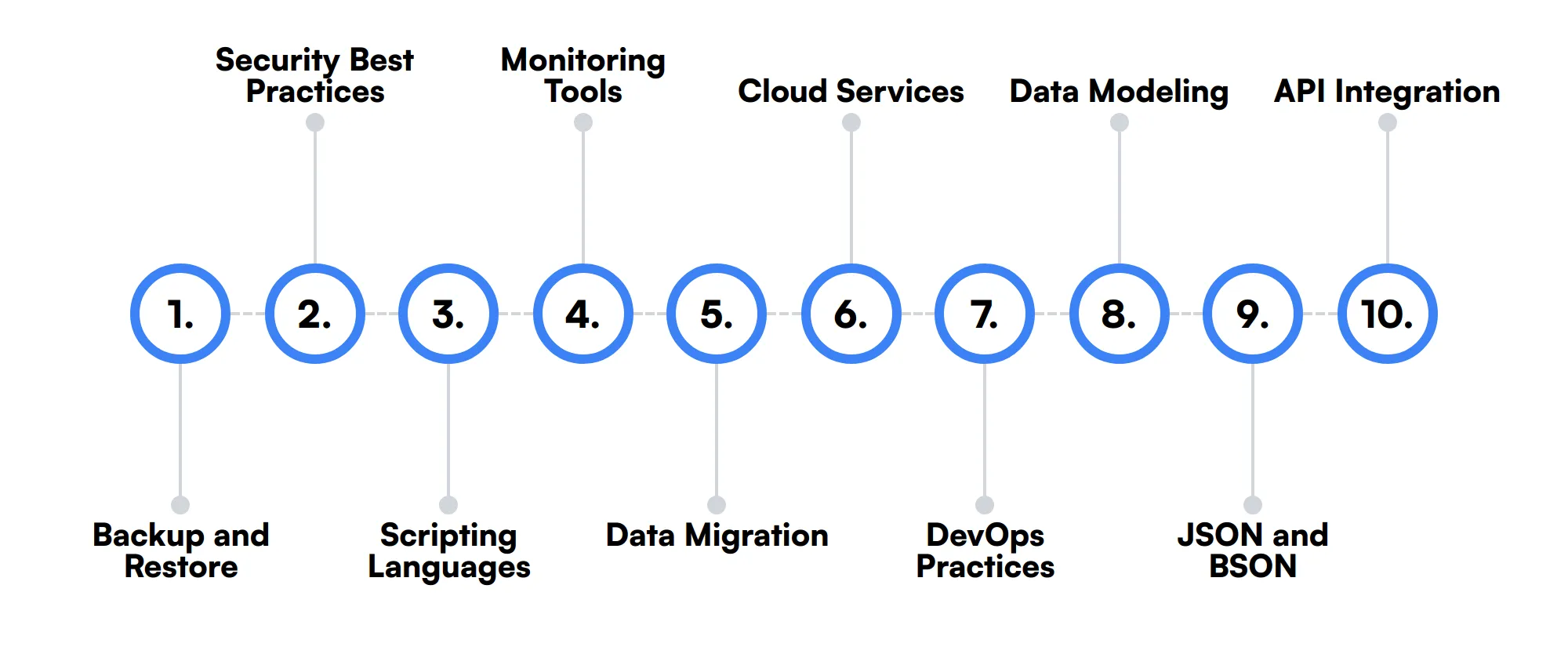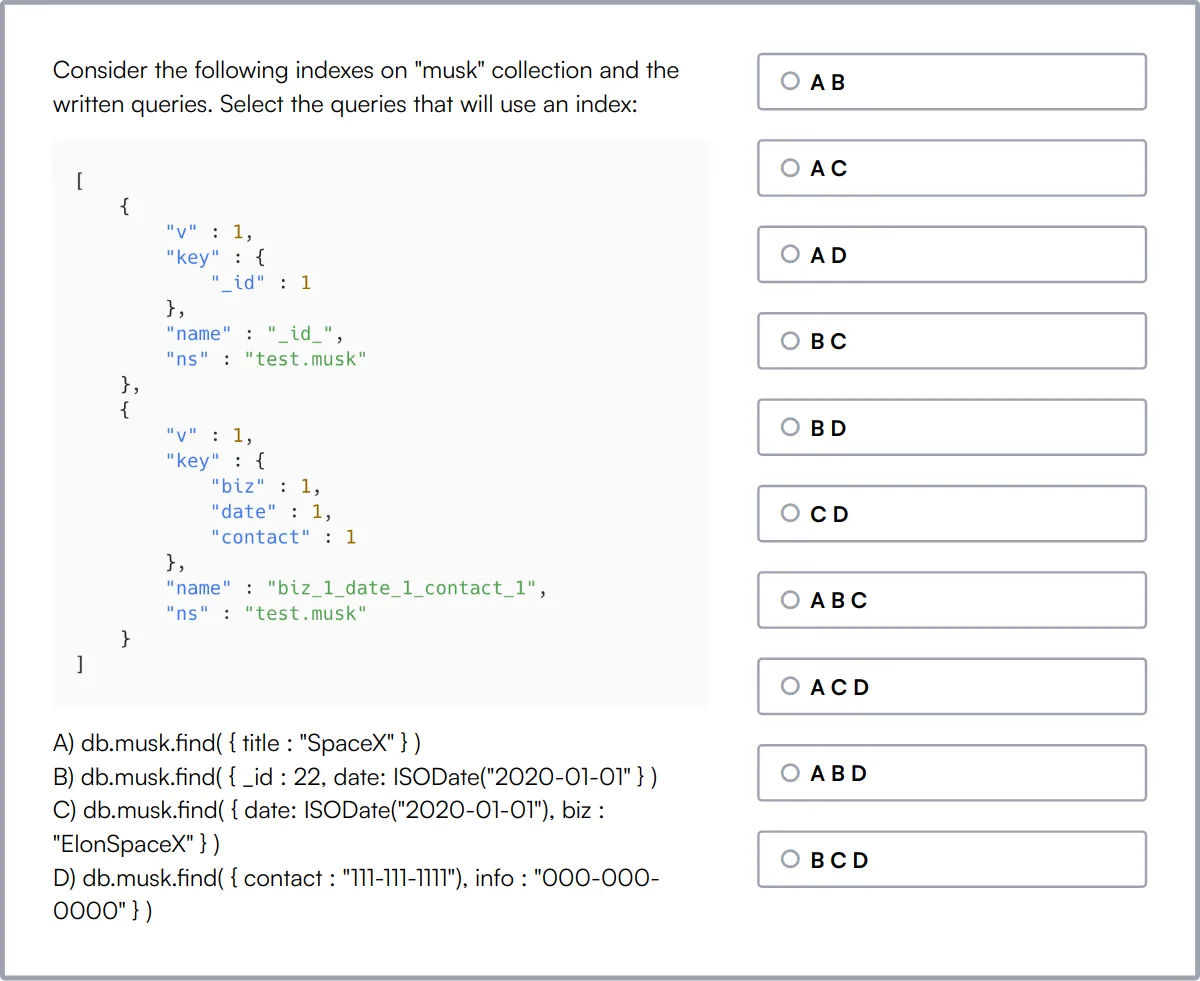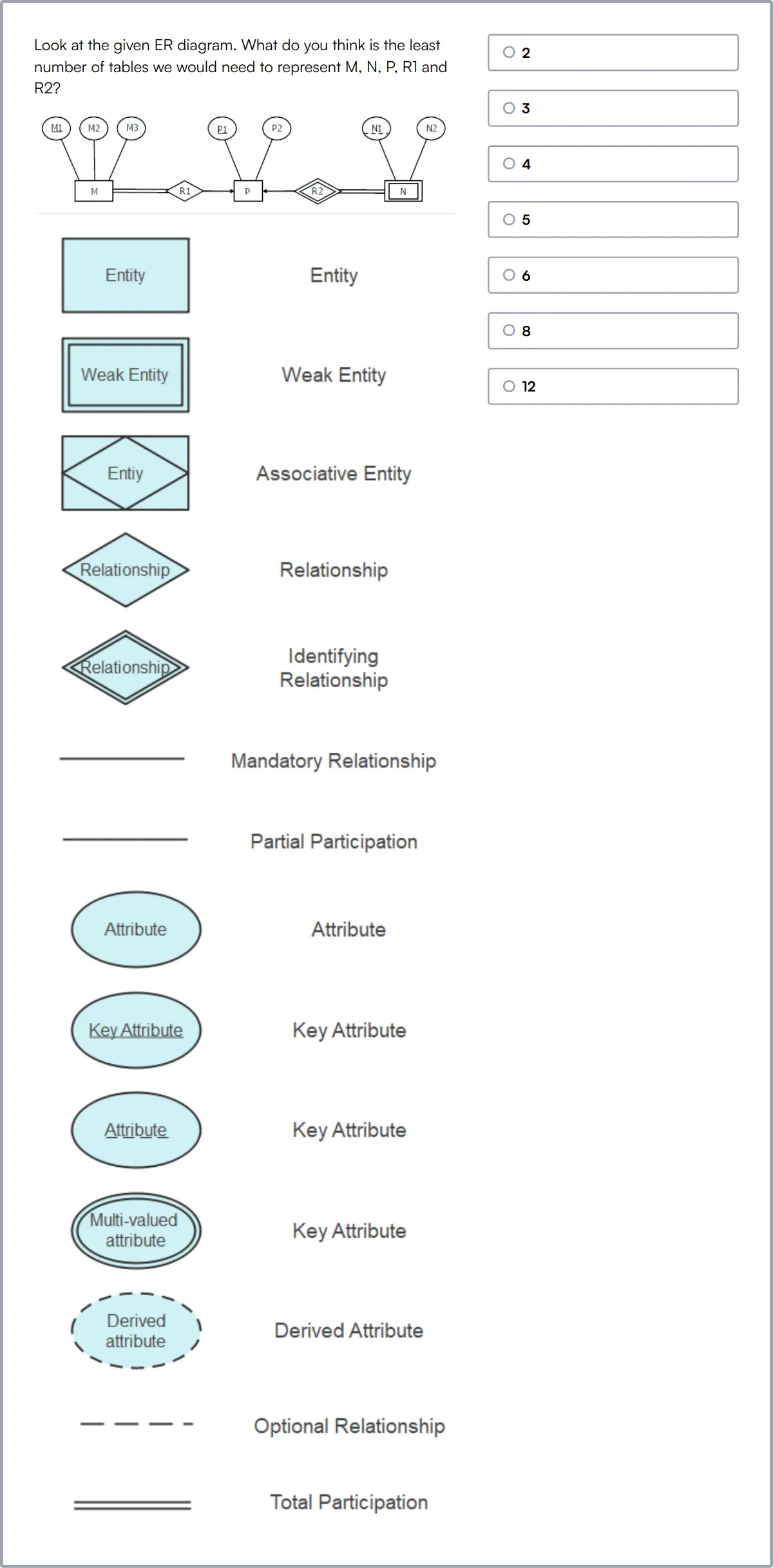MongoDB developers are responsible for managing and optimizing databases that store and retrieve large volumes of data. They ensure that the database performs efficiently and can handle the demands of various applications and services.
Skills for MongoDB developers include proficiency in database design, understanding of NoSQL concepts, and experience with MongoDB query language. Additionally, they need strong analytical skills and the ability to troubleshoot and optimize database performance.
Candidates can write these abilities in their resumes, but you can’t verify them without on-the-job MongoDB Developer skill tests.
In this post, we will explore 7 essential MongoDB Developer skills, 10 secondary skills and how to assess them so you can make informed hiring decisions.
Table of contents
7 fundamental MongoDB Developer skills and traits
The best skills for MongoDB Developers include MongoDB Query Language, Schema Design, Indexing, Aggregation Framework, Replication, Sharding and Performance Tuning.
Let’s dive into the details by examining the 7 essential skills of a MongoDB Developer.

MongoDB Query Language
Understanding MongoDB Query Language (MQL) is fundamental for a MongoDB Developer. It allows you to interact with the database, perform CRUD operations, and retrieve data efficiently. Mastery of MQL ensures you can write optimized queries to handle large datasets.
For more insights, check out our guide to writing a MongoDB Developer Job Description.
Schema Design
Schema design in MongoDB is different from traditional relational databases. A MongoDB Developer must know how to design schemas that leverage the flexibility of document-based storage. Proper schema design can significantly impact the performance and scalability of your application.
Indexing
Indexing is crucial for improving query performance. A MongoDB Developer should understand how to create and manage indexes to speed up data retrieval. Knowing when and how to use compound indexes, text indexes, and geospatial indexes can make a big difference in application performance.
Aggregation Framework
The Aggregation Framework in MongoDB allows for complex data processing and transformation. A MongoDB Developer uses this skill to perform operations like filtering, grouping, and sorting data. Mastery of this framework is essential for generating reports and analytics.
Replication
Replication ensures data availability and redundancy. A MongoDB Developer must know how to set up and manage replica sets to provide high availability and data durability. This skill is critical for maintaining data integrity and minimizing downtime.
Sharding
Sharding is a method for distributing data across multiple servers. A MongoDB Developer should understand how to implement sharding to handle large datasets and ensure horizontal scalability. Proper sharding strategies can help manage growing data volumes efficiently.
Performance Tuning
Performance tuning involves optimizing database operations to ensure fast and efficient data access. A MongoDB Developer needs to identify bottlenecks and apply best practices for query optimization, indexing, and resource management. This skill is essential for maintaining a responsive application.
10 secondary MongoDB Developer skills and traits
The best skills for MongoDB Developers include Backup and Restore, Security Best Practices, Scripting Languages, Monitoring Tools, Data Migration, Cloud Services, DevOps Practices, Data Modeling, JSON and BSON and API Integration.
Let’s dive into the details by examining the 10 secondary skills of a MongoDB Developer.

Backup and Restore
Knowing how to perform backup and restore operations is important for data recovery. A MongoDB Developer should be familiar with various backup strategies to protect data against loss or corruption.
Security Best Practices
Implementing security best practices is crucial for protecting sensitive data. A MongoDB Developer should understand authentication, authorization, and encryption techniques to secure the database.
Scripting Languages
Proficiency in scripting languages like JavaScript or Python can be beneficial. A MongoDB Developer often uses these languages to write scripts for data manipulation, automation, and integration with other systems.
Monitoring Tools
Monitoring tools help track the performance and health of the database. A MongoDB Developer should be familiar with tools like MongoDB Atlas, Prometheus, or Grafana to monitor and troubleshoot issues.
Data Migration
Data migration involves transferring data from one database to another. A MongoDB Developer should know how to plan and execute data migration tasks to ensure data integrity and minimal downtime.
Cloud Services
Understanding cloud services like AWS, Azure, or Google Cloud can be advantageous. A MongoDB Developer may need to deploy and manage MongoDB instances in the cloud, leveraging cloud-native features for scalability and reliability.
DevOps Practices
Familiarity with DevOps practices can streamline database management. A MongoDB Developer should know how to use CI/CD pipelines, containerization, and infrastructure as code to automate deployment and maintenance tasks.
Data Modeling
Data modeling involves designing the structure of the database. A MongoDB Developer should understand how to model data to support application requirements and ensure efficient data access.
JSON and BSON
MongoDB stores data in BSON format, which is a binary representation of JSON. A MongoDB Developer should be comfortable working with JSON and BSON to handle data interchange and storage.
API Integration
API integration allows the database to interact with other systems. A MongoDB Developer should know how to integrate MongoDB with RESTful or GraphQL APIs to enable seamless data exchange.
How to assess MongoDB Developer skills and traits
Assessing the skills of a MongoDB developer involves more than just glancing at a resume. It requires a deep understanding of their technical capabilities in areas such as MongoDB Query Language, Schema Design, Indexing, and more. Knowing how to evaluate these skills effectively is key to finding the right candidate for your team.
Traditional interviews often fall short in accurately gauging a candidate's practical abilities. This is where skills assessments come into play. By using targeted tests, you can measure a developer's proficiency in critical areas like Aggregation Framework, Replication, Sharding, and Performance Tuning.
Adaface assessments offer a streamlined approach to evaluate MongoDB developer skills. With tests designed to reflect real-world problems, they help ensure that your hiring process not only identifies skilled candidates but also significantly reduces the time spent screening. Learn more about Adaface MongoDB assessments here.
Let’s look at how to assess MongoDB Developer skills with these 2 talent assessments.
MongoDB Online Test
Our MongoDB Online Test evaluates a candidate's ability to design NoSQL schemas, perform CRUD operations, and optimize MongoDB clusters. This test is designed to assess comprehensive MongoDB skills from basic operations to advanced data handling and performance optimization.
The test assesses a candidate's understanding of MongoDB basics, data modeling, CRUD operations, and advanced features like the Aggregation Framework, Query Plan, and Profiler. It also evaluates knowledge in managing replica sets, sharding, and implementing security measures in MongoDB environments.
Successful candidates demonstrate proficiency in enhancing database performance through effective indexing, fault tolerance strategies, and deployment techniques. The test also measures their ability to handle backup and recovery processes, ensuring data integrity and security.

Data Modeling Skills Test
Our Data Modeling Skills Test assesses a candidate's expertise in database design principles, SQL, and data integrity mechanisms. It is tailored to evaluate skills in creating efficient data models and transforming data according to business requirements.
This test covers key areas such as ER diagrams, normalization, relational schema design, and SQL querying capabilities. It challenges candidates to apply their knowledge in data mapping, validation, and transformation to ensure accurate and useful data storage and retrieval.
High-scoring candidates will show a strong ability to maintain data integrity and optimize database schemas to support efficient data queries and operations. This test also gauges their proficiency in SQL and their understanding of complex data relationships and transformations.

Summary: The 7 key MongoDB Developer skills and how to test for them
| MongoDB Developer skill | How to assess them |
|---|---|
| 1. MongoDB Query Language | Evaluate proficiency in writing and optimizing MongoDB queries. |
| 2. Schema Design | Assess ability to design scalable and efficient database schemas. |
| 3. Indexing | Check skills in creating and managing indexes for performance. |
| 4. Aggregation Framework | Gauge expertise in using aggregation pipelines for data processing. |
| 5. Replication | Determine knowledge of setting up and managing replica sets. |
| 6. Sharding | Evaluate understanding of partitioning data across multiple servers. |
| 7. Performance Tuning | Assess capability to optimize database performance. |
MongoDB Online Test
MongoDB Developer skills FAQs
What is MongoDB Query Language and why is it important for a MongoDB Developer?
MongoDB Query Language (MQL) is used to interact with MongoDB databases. It allows developers to perform CRUD operations, filter data, and execute complex queries. Proficiency in MQL is essential for efficient database management.
How can you assess a candidate's skills in Schema Design for MongoDB?
Ask candidates to design a schema for a sample application. Evaluate their understanding of embedding vs. referencing, normalization vs. denormalization, and their ability to optimize for read and write operations.
What are the key aspects to evaluate in a candidate's knowledge of Indexing in MongoDB?
Assess their understanding of different types of indexes (single field, compound, text, etc.), how to create and use indexes, and their impact on query performance. Practical exercises can be useful.
Why is the Aggregation Framework important and how can you test a candidate's proficiency?
The Aggregation Framework is used for data processing and transformation. Test candidates by asking them to write aggregation pipelines for specific data analysis tasks, focusing on stages like $match, $group, and $project.
What should you look for when assessing a candidate's knowledge of Replication in MongoDB?
Evaluate their understanding of replica sets, election processes, and how replication ensures data availability and redundancy. Practical questions on setting up and managing replica sets can be insightful.
How can you determine a candidate's expertise in Sharding?
Ask about their experience with sharding strategies, shard keys, and balancing data across shards. Practical scenarios where they need to design a sharding solution can reveal their depth of knowledge.
What are some ways to assess a candidate's skills in Performance Tuning for MongoDB?
Evaluate their ability to identify and resolve performance bottlenecks. Ask about their experience with profiling, indexing strategies, and optimizing queries. Practical exercises can be very telling.
How can you test a candidate's understanding of Security Best Practices in MongoDB?
Ask about their knowledge of authentication, authorization, encryption, and network security. Scenarios where they need to secure a MongoDB deployment can help assess their practical skills.

40 min skill tests.
No trick questions.
Accurate shortlisting.
We make it easy for you to find the best candidates in your pipeline with a 40 min skills test.
Try for freeRelated posts
Free resources



